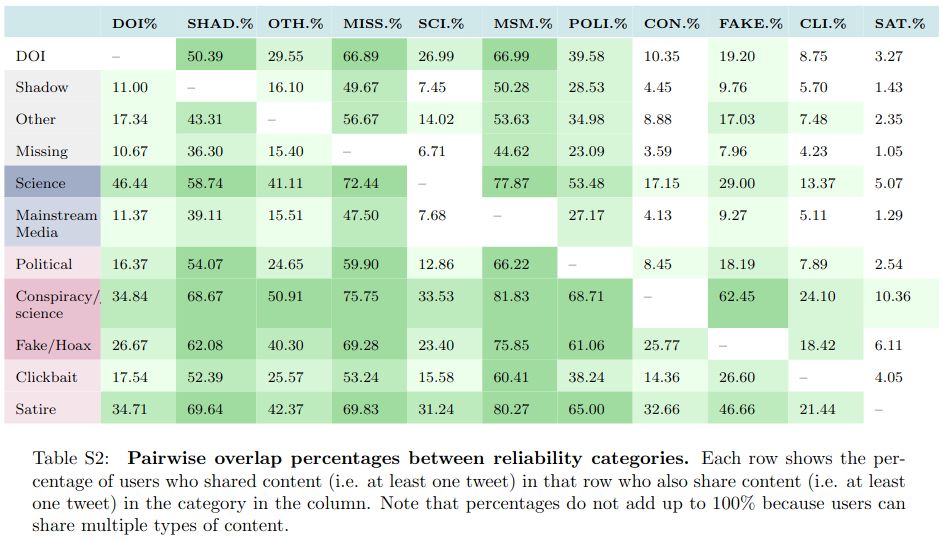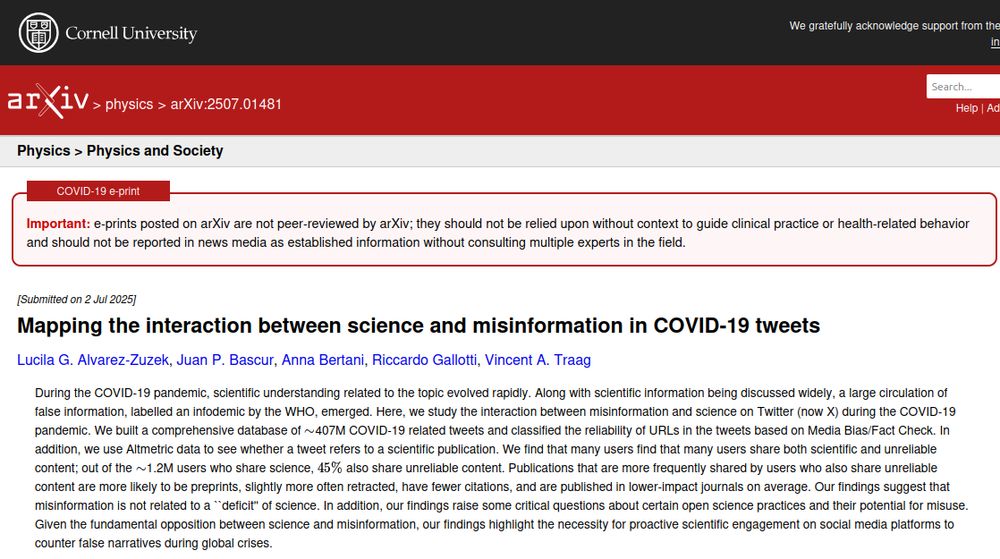Vincent Traag
@vtraag.bsky.social
Senior researcher at CWTS, Leiden University. Computational social science, science studies, modelling & networks.
Om een idee te geven: dit is het soort resultaat wat ik krijg met mijn model op basis van de laatste peilingen. De veel grotere onzekerheid wordt gedreven door het grote aandeel zwevende kiezers (47-83%).

October 25, 2025 at 6:59 AM
Om een idee te geven: dit is het soort resultaat wat ik krijg met mijn model op basis van de laatste peilingen. De veel grotere onzekerheid wordt gedreven door het grote aandeel zwevende kiezers (47-83%).
We suggest the early-career setback effect may be due to a selection effect of unfunded applicants being particularly more likely to reapply later if they have a high citation impact.
5/8
5/8

October 15, 2025 at 8:56 AM
We suggest the early-career setback effect may be due to a selection effect of unfunded applicants being particularly more likely to reapply later if they have a high citation impact.
5/8
5/8
The early-career setback effect states that researchers who received early-career funding (and continue in academia) show a lower citation impact than those who did not. This effect also replicates, but not robustly across funders and model specifications, nor generalises beyond the grey zone.
4/8
4/8

October 15, 2025 at 8:56 AM
The early-career setback effect states that researchers who received early-career funding (and continue in academia) show a lower citation impact than those who did not. This effect also replicates, but not robustly across funders and model specifications, nor generalises beyond the grey zone.
4/8
4/8
Most existing studies rely on a regression discontinuity design to infer the Matthew effect. Although a robust design, it only infers effects in the "grey zone" around the funding line. We use a model to study the effect beyond the "grey zone" and find that the Matthew effect generalises.
3/8
3/8

October 15, 2025 at 8:56 AM
Most existing studies rely on a regression discontinuity design to infer the Matthew effect. Although a robust design, it only infers effects in the "grey zone" around the funding line. We use a model to study the effect beyond the "grey zone" and find that the Matthew effect generalises.
3/8
3/8
The Matthew effect states that researchers who received early-career funding are more likely to obtain later-career funding. This effect replicates, is robust across funders and model specifications.
2/8
2/8

October 15, 2025 at 8:56 AM
The Matthew effect states that researchers who received early-career funding are more likely to obtain later-career funding. This effect replicates, is robust across funders and model specifications.
2/8
2/8
📢 New reviewed preprint, published by @elife.bsky.social at doi.org/10.7554/eLif.... We study two effects in science funding across 14 different funding programmes from 6 research funders across Europe and North America: (1) The Matthew effect; and (2) and the early-career setback effect.
🧵1/8
🧵1/8

October 15, 2025 at 8:56 AM
📢 New reviewed preprint, published by @elife.bsky.social at doi.org/10.7554/eLif.... We study two effects in science funding across 14 different funding programmes from 6 research funders across Europe and North America: (1) The Matthew effect; and (2) and the early-career setback effect.
🧵1/8
🧵1/8
🤩 Fantastic new network plotting package available in Python by Fabio Zanini. The package supports both networkx and igraph networks, and has a wide variety of styling options. iplotx.readthedocs.io/en/latest/

October 3, 2025 at 7:11 AM
🤩 Fantastic new network plotting package available in Python by Fabio Zanini. The package supports both networkx and igraph networks, and has a wide variety of styling options. iplotx.readthedocs.io/en/latest/
One possibility is that scientists mention untrustworthy sources in order to debunk claims made by those sources. We find that tweets by scientists that refer to untrustworthy sources are indeed more likely to show a negative sentiment. (7/10)

July 4, 2025 at 10:38 AM
One possibility is that scientists mention untrustworthy sources in order to debunk claims made by those sources. We find that tweets by scientists that refer to untrustworthy sources are indeed more likely to show a negative sentiment. (7/10)
Restricting unreliable domains to fake/hoax and conspiracy theory, we find that scientists with more followers tend to refer more to such untrustworthy sources (but still less than non-scientists). (6/10)

July 4, 2025 at 10:38 AM
Restricting unreliable domains to fake/hoax and conspiracy theory, we find that scientists with more followers tend to refer more to such untrustworthy sources (but still less than non-scientists). (6/10)
We observe that publications that are more often shared by users who also share unreliable sources tend to be less well cited, appear in lower impact journals, are more often retracted, are more likely to be open access and more likely to be preprinted. (5/10)

July 4, 2025 at 10:38 AM
We observe that publications that are more often shared by users who also share unreliable sources tend to be less well cited, appear in lower impact journals, are more often retracted, are more likely to be open access and more likely to be preprinted. (5/10)
The network of publications co-shared by Twitter users shows a clear cluster of papers that are likely to be shared by users who also share unreliable URLs. One of the most central papers in those circles is a paper about data integrity issues in Pfizer's vaccine trial. (4/10)

July 4, 2025 at 10:38 AM
The network of publications co-shared by Twitter users shows a clear cluster of papers that are likely to be shared by users who also share unreliable URLs. One of the most central papers in those circles is a paper about data integrity issues in Pfizer's vaccine trial. (4/10)
Surprisingly, we find that users who share unreliable URLs are more likely to share science. Moreover, this is particularly concentrated in more untrustworthy domains classified as fake/hoax or conspiracy theory. (3/10)

July 4, 2025 at 10:38 AM
Surprisingly, we find that users who share unreliable URLs are more likely to share science. Moreover, this is particularly concentrated in more untrustworthy domains classified as fake/hoax or conspiracy theory. (3/10)
New preprint! 🚨
We study the interaction between misinformation and science on Twitter during COVID-19 based on ~407M tweets. Both science and misinformation featured prominently during the pandemic, but the interaction between the two has not been studied on this scale before.
🧵 (1/10)
We study the interaction between misinformation and science on Twitter during COVID-19 based on ~407M tweets. Both science and misinformation featured prominently during the pandemic, but the interaction between the two has not been studied on this scale before.
🧵 (1/10)

July 4, 2025 at 10:38 AM
New preprint! 🚨
We study the interaction between misinformation and science on Twitter during COVID-19 based on ~407M tweets. Both science and misinformation featured prominently during the pandemic, but the interaction between the two has not been studied on this scale before.
🧵 (1/10)
We study the interaction between misinformation and science on Twitter during COVID-19 based on ~407M tweets. Both science and misinformation featured prominently during the pandemic, but the interaction between the two has not been studied on this scale before.
🧵 (1/10)
Great to see @luzuzek.bsky.social present our work on the interaction between science and misinformation during COVID-19 yesterday at @netsciconf.bsky.social

June 3, 2025 at 7:15 AM
Great to see @luzuzek.bsky.social present our work on the interaction between science and misinformation during COVID-19 yesterday at @netsciconf.bsky.social

